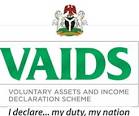There are strong indications that the Federal Government may auction properties and other assets of individual and corporate tax defaulters anytime from now for failure to declare or pay taxes on such assets as required under the Voluntary Assets and Income Declaration Scheme (VAIDS).
The deadline set by the scheme for assets and income owners to voluntarily declare their incomes and assets for tax purposes to enjoy some waivers expire on Saturday, March 31, 2018.
A reliable source close to the fiscal authorities hinted that the Federal Internal Revenue Service (FIRS) is set to go after defaulters’ properties immediately after the Easter holidays.
Aside the fact that government is taking stock of those undeclared assets through available information database from relevant agencies, the source says that government is also working to get court orders as legal backing to dispose such assets.
According to her, the federal tax administration agency, the FIRS, has since July last year been collating data from such agencies, including the Nigeria Immigration Service, the Federal Road Safety Corps, Nigeria Customs and National Identity Management Commission, amongst others with the aim of harmonizing information on property owners in major cities, particularly Abuja and Lagos.
Commenting on what would the position of government on tax defaulters after the expiration o the VAIDS deadline, the Executive Chairman of the FIRS, Mr. Babatunde Fowler, was quoted as saying:“What follows after the deadline is that we shall follow the laws that deal with tax administration and for those that are not complaint, we shall investigate them and if need be we prosecute them.
“We shall take all actions in line with the law, which include the stoppage of their business activities and if need be, the sale of assets”, Fowler stressed.
Analysts believe that government’s efforts to deal with property and other asset owners overseas may further be bolstered with Nigeria having On Wednesday 27 January 2016, endorsed the Multilateral Competent Authority Agreement (MCAA) for the automatic exchange of Country-by-Country reports.
According to the OECD, the pact which was signed by 31 countries is part of continuing efforts to boost transparency by multinational enterprises (MNEs) and the signing marks an important milestone towards implementation of the OECD/G20 BEPS Project. It is also a significant indication of cross-border cooperation on tax matters.
The MCAA will enable consistent and swift implementation of new transfer pricing reporting standards developed under the BEPS Action Plan.
It was also designed to also ensure that tax administrations obtain a complete understanding of the way MNEs structure their operations and also ensuring that the confidentiality of such information is safeguarded.
The pact is expected to help the Federal Government work in collaboration with other foreign governments to access information on overseas assets owned by Nigerians or acquired through productive engagements in the country by foreigners for tax computation and payment purposes.
It is reliably gathered that the Federal Government is already contacting some UK banks, including the HSBC, Barclays Bank, Lloyds and others with a view to sourcing for information of tax payments on Nigerians operating accounts in United Kingdom.
It would be recalled that recently, the UK and other European countries have initiated measures aimed at tightening existing regulations and increased taxes for non-UK based buyers of British properties.
For instance, a former Tory justice minister, Lord Faulks, and Lord Hodgson both in the UK have urged the British government to establish a register exposing the beneficial owners of overseas companies and legal entities, and want it done within 12 months.
As the agitation for transparency in financial dealings in the country gains more traction, the British Prime Minister, Theresa May, had in January, during her appearance at the House of Lords, indicated plans to set a timetable to break the secrecy surrounding the foreign ownership of British property worth billions of pound sterling.
To demonstrate that government is not opposed to Nigerians owning property in any part of the world, the Minister of Finance, Mrs. Kemi Adeosun, had assured recently that “Nigerians can legally keep their money anywhere in the world but they must first pay any taxes due to the Nigerian Government.”






